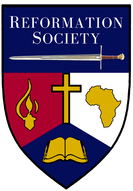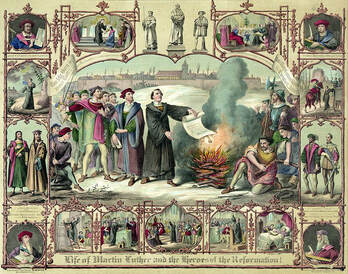 “Those from among you shall build the old waste places; You shall raise up the foundations of many generations; And you shall be called the Repairer of the Breach, The Restorer of Streets to Dwell In.” Isaiah 58:12 The Reformation in Europe during the 16th Century was one of the most important epochs in the history of the world. The Reformation gave us the Bible – now freely available in our own languages. The now almost universally acknowledged principles of religious freedom, liberty of conscience, the rule of law, separation of powers and constitutionally limited republics were unthinkable before the Reformation. The Reformers fought for the principles that Scripture alone is our final authority, Christ alone is the Head of the Church and Justification is by God’s grace, on the basis of the finished work of Christ, received by faith alone. Some influential developments which preceded the Reformation: “The Black Death.” The Bubonic plague, spread by lice on rats from China, wiped out over one third of Europe’s population. The invasion of Muslim Turks who swept over the Balkans and even reached the gates of Vienna. There was also a massive influx of pagan Greek humanistic writings (as a result of the fall of Constantinople and the Byzantine Empire). This led to a renaissance of pagan humanistic thinking. There was widespread corruption of the Roman Catholic system with superstitions and un-Biblical doctrines taught and with positions in the church for sale – open to the highest bidder. People were also encouraged to “purchase salvation” with the sale of Papal Indulgences. The invention of the printing press and the printing of the first book (a Bible) in 1456, by Johan Gutenberg, was one very positive development, which made possible the rapid dissemination of Reformation doctrines. 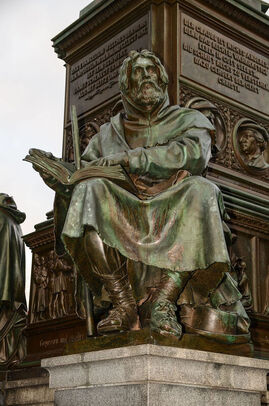 The Waldensians Firm and Faithful Alpine Fighters for the Faith Peter Waldo was a wealthy merchant, well respected and a man of influence, in the community of Lyons.One evening, while entertaining friends at his home, one of them suffered a sudden seizure and died. This incident so shook Waldo that he began to seriously think of his soul and eternity beyond the grave. He began to regularly attend church services, but was not satisfied with the superficial rituals in Latin. Studying the Scriptures He employed two priests to come to his house to translate the Gospels of Christ into French. Waldo was most excited as he read, meditated on and carefully studied the Words of Christ. Yet, instead of comfort and peace, he found conviction and challenge. He saw himself as the foolish rich man who was laying up treasures on earth, but was spiritually poor towards God. Again and again he read the Words of Christ: “Take heed and beware of covetousness, for the abundance of a man’s life consisteth not in those things which he possesseth” Luke 12:15. 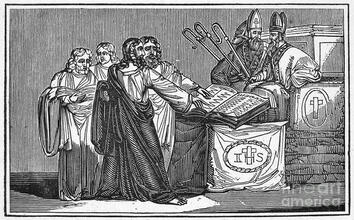 A determination to Follow Christ He determined to obey the command of Christ to the rich man recorded in Mark 10:22: “If you wish to be perfect, sell what you have and follow Me.” This Waldo saw as the Gospel resolution to his personal crisis. He determined to follow this exhortation of Christ literally.He gave all of his possessions to the poor in his community as restitution for his former business practices. He denied himself and followed Christ as a poor man. As Waldo’s friends, family and neighbours thought him insane, he replied to them: “My friends and fellow citizens, I am not out of my mind as some of you think. I have avenged myself on these my enemies, who kept me in such slavery, that I cared more for money than for God and served more willingly the creature rather than the Creator.” After Waldo had finished distributing all of his property and possessions, he found many of the poor standing by his side, not content with mere existence, but desiring to live as true Christians, even as Waldo was demonstrating and proclaiming. After receiving a call from the pope’s representative to clarify his position and the intentions of his new movement, Waldo declared: “We have decided to live by the Words of the Gospel, especially that of the sermon on the Mount and the Commandments, that is, to live in poverty, without concern for tomorrow. But we hold that also those who continue to live their lives in the world doing good will be saved.” Waldo did not intend to separate from the Catholic Church, but rather to work for its reformation from within. It also was not his intention to start a new church. From the beginning the Waldensians described themselves only as: “The poor.” Vows of poverty in the Middle Ages were not unusual. There were numerous monastic movements, which had done that, such as The Franciscans of Francis of Assisi. However, Waldo remained a layman and his followers did not call themselves “brothers” as the monks did, but as “co-members” of the “society.” They took these terms from the business world and avoided describing themselves in religious terms. They wanted only to be a group of lay persons who were working together for the living and preaching of the Gospel. Their purpose was to live the Christian Faith according to the teachings of Jesus Christ, as found in the Gospels.  A Bible Study Movement For this purpose they emphasised the importance of hearing and understanding the Word of God, the Bible. It was from the Scriptures that men and women could know Christ as the focus of their Faith. They chose to live in voluntary poverty and sought to be faithful in proclaiming the Gospel in public. This greatly offended the religious leaders of their time and brought the wrath of the Catholic church upon them. Pressure Begins to Build The archbishop of Lyons attempted to stop Waldo from preaching. Public preaching, according to the Catholic theologians, was reserved for the clergy alone. According to Catholic belief and practice at that time, Waldo, the merchant, not being ordained, had no right to preach. This Waldo challenged: “Who are the real successors of the Apostles? Not necessarily those who are ordained, but rather those who respond to the Lord’s call and live like the Apostles of old. What makes one a true heir to the Apostles is not ecclesiastical ordination, but faithfulness to the Word of God. The authority to preach God’s Word does not come through any church organisation, but from Christ Himself." Waldo asserted that God’s Word and His Spirit do surely act within the church, but they are not solely administered by it. 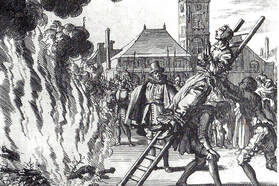 A Decisive Challenge As a result, Waldo was severely threatened by the archbishop of Lyon. The archbishop ordered him to cease his preaching. To this Waldo responded: “It is better to obey God than man.” For this bold defiance, quoting the words of the Apostle Peter in Acts 4:19, his followers began to call him Peter Waldo. Persecution Unleashed The archbishop excommunicated Waldo and had him banished from the city. With great zeal, Peter Waldo and his followers scattered the Gospel seed throughout Northern Italy, Southern France, Switzerland, Austria and Germany. The Council of Verona pronounced fearsome anathemas upon the poor men of Lyons who presumed to preach the Gospel without ordination and to dare to translate the Scriptures from Latin into the vernacular. As a result, the Waldensians were hunted down by agents of the Inquisition and many thousands were imprisoned, tortured and put to death. Resistance Grows At first the Waldensians were pacifists, rejecting any form of violence, even in self-defence. They also refused to take oaths. However, in time, other generations of Waldensians grew to be resourceful soldiers, tenacious fighters and innovative military strategists, defeating Catholic armies and securing religious freedom for their beleaguered families in the Alps of Piedmont. Some of the Waldensian precepts for living in the world included: We must not love the world. We must, if possible, live at peace with men. We must shun evil company. We must not avenge ourselves. We must love our enemies. We must possess our souls in patience. We must not be unequally yoked with unbelievers. Some of the Waldensian precepts for personal holiness included: We shall not serve the lusts of the flesh. We shall govern worldly thoughts. We shall mortify our members. We shall shun idleness. We shall practice works of mercy. We shall live in faith and morality. We shall fight against lusts. We shall speak to one another of the Will of God. We shall diligently examine our consciences. We shall purify, improve and compose the spirit and mind.  Resilience Under Fire and Sword Despite centuries of relentless and vicious, persecution and harsh oppression, the Waldensians not only managed to survive, but to expand, always attracting new followers and managing to proclaim the Gospel in new areas. Reformation Revelations Peter Waldo grasped the great Reformation principles of the supreme authority of Holy Scripture and salvation by grace through faith. He lifted up the principle that Christ’s Law must be supreme. He recognised that the churches had become unfaithful to God’s Law and to the Gospel of Christ. In their worldly quest for temporal riches and power, the church had long since abandoned the humility of Christ and the poverty of the Apostles. By compromising with the world it had lost its spiritual power. Evangelists But the Waldensians did not seek to be separatists, but to purify the church from within. From the very beginning of this movement, the Waldensians have always been known as distributors of the Scriptures and Christian literature. As a result, their followers were found as far afield as the Danube River in Austria, in Northern Germany and in Bohemia where their teachings and example helped inspire the great Bohemian professor and Reformer Jan Hus. 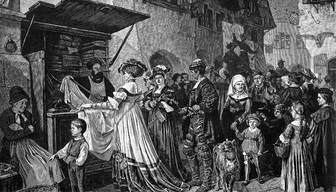 Traveling Salesmen Some of the most effective Waldensian evangelists were salesmen, merchants who travelled from town to town selling fabrics, clothing, jewelry, artifacts and alluding to more precious goods in their possession - to jewels of inestimable value, even The Pearl of Great Price – the Gospel of Jesus. Gospel Simplicity In German, the Waldensians were called: “Apostles.” The Polish described them as: “Men who tell the truth.” The Waldensians became known as those who proclaimed the Bible as the only rule for faith and conduct. They rejected the papacy, purgatory, indulgences, the mass and other forms of superstition, as unBiblical. They rejected religious formalism in favour of Gospel simplicity. They promoted Christ-centred worship, Bible reading, faithful prayer and Scriptural preaching as the responsibility of all believers. Tribulation The Council of Valencia (1229) forbid men who were not priests to read the Bible, whether in Latin, or in the vernacular. The Bible itself was placed on The Index of Forbidden Books. A savage wave of persecution rose up against the Waldensians. The Inquisition resorted to a murderous campaign which tortured and slaughtered thousands of these faithful Bible believers. 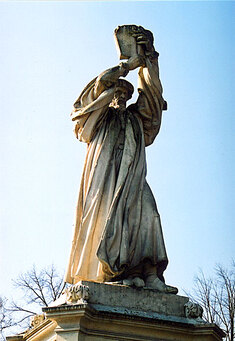 Protestant Allies Early in the Reformation, French Reformer, Guillaume Farel, travelled across the Alps and recruited the Waldensians into the mainstream of the Reformation. The persecution of the Waldensians intensified in the 17th Century and in 1655, Oliver Cromwell, Lord Protector of England, declared a Solemn Fast on behalf of the suffering Waldensian believers. The Protector threatened to send the English Navy to the Mediterranean to strike a blow on behalf of the Protestant cause and threatened military intervention unless the persecution ceased. Oliver Cromwell’s secretary, John Milton, wrote a famous sonnet on the Massacres at Piedmont and Cromwell himself headed a campaign to raise support for the Waldensians with a personal gift of 2,000 pounds. He urged their cause so whole-heartedly that over half a million pounds was donated for the suffering Waldensians. Cromwell’s vigorous intercession and threat of mobilising English naval and military action, brought the persecution of the Waldensians to a close. The Waldensians survive to this day, the oldest Evangelical church, with a heritage of over 800 years of faithful proclamation of the Gospel and firm resistance against tyranny. “To him who overcomes, I will give the right to eat from the Tree of Life.” Revelation 2:7 John Wycliffe (1320 - 1384) The Morning Star of the Reformation In the 14th Century, Oxford was the most outstanding university in the world and John Wycliffe was its leading Theologian and philosopher. The Black Death (the Bubonic Plague), which killed a third of the population of Europe, led Wycliffe to search the Scriptures and find salvation in Christ. 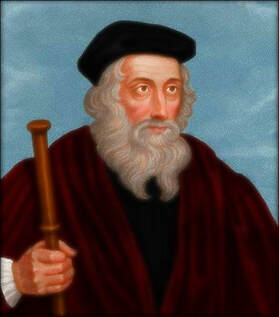 The King’s Champion As a professor at Oxford University, Wycliffe represented England in a controversy with the pope. Wycliffe championed the independence of England from Papal control. He supported King Edward III’s refusal to pay taxes to the pope. (It was only one step away from denying the political supremacy of the pope over nations to questioning his spiritual supremacy over churches). The royal favour which Wycliffe earned from this confrontation protected him later in life. Wycliffe’s patron and protector was John of Gaunt. This English prince was the most powerful political figure in late 14th Century England. Gaunt, known in his day as the Duke of Lancaster, was effectively the Prime Minister of England during the last years of the 50-year reign of his then senile father, King Edward III. Gaunt was “a wise diplomat, a bold soldier, the epitome of chivalry, hard on his enemies and always faithful to what he believed was best for England.” In 1399 Gaunt’s son ascended the throne as King Henry IV. All Authority is Under God In Wycliffe’s book Civil Dominion, he maintains that the ungodly have no right to rule. All authority is granted by God, but God does not grant any authority to those who are in rebellion against Him. Those who rule unjustly are in breach of the terms under which God delegates authority. So wicked rulers have forfeited their right to rule. In fact, all of those who lead blatantly sinful lives forfeit their rights in this world. 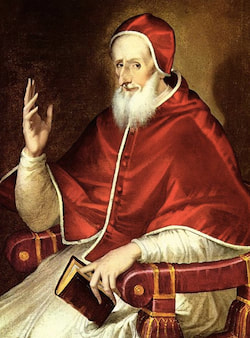 Corruption Disqualifies Leaders Wycliffe also taught that the clergy of his time were so corrupt that the secular authorities had the right to confiscate their properties. The Roman church at that time owned about one third of all land in England and claimed exemption from taxation, yet the pope claimed the right to tax the English – to finance his own wars! Wycliffe maintained that the English government had the God-given responsibility to correct the abuses of the church within its realm and to remove from office those churchmen who persisted in their corruption and immorality. Servant Leadership and Sacrifice Wycliffe taught that our personal relationship with God is everything. Character is the fundamental basis of any leadership. He emphasised apostolic poverty, insisting that those who claimed to sit on Saint Peter’s chair should, like the Apostle, be without silver or gold. To Wycliffe, those who claimed to follow the Apostles should live poor and humble lives spent in the service of the Church, setting an example of holiness. Therefore the pope of Rome should be a shepherd of the flock and a preacher who brings men to Christ. Wycliffe denounced the worldliness and luxury of the popes and the spiritual bankruptcy of the office of pope. The papacy had departed from the simple Faith and practice of Christ and His disciples. Wycliffe wrote: “Christ is truth, the pope is the principle of falsehood. Christ lived in poverty, the pope labours for worldly magnificence. Christ refused temporal dominion, the pope seeks it.” 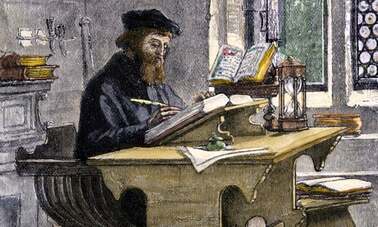 Christ Alone is the Head of the Church In his book “The Power of the papacy” published in 1379, Wycliffe argues that the papacy is an office instituted by man, not God. No pope’s authority could extend to secular government. The only authority that any pope might have would depend upon him having the moral character of the Apostle Peter. Any pope who does not follow Jesus Christ is anti-Christ. Wycliffe proclaimed that “Christ alone is the Head of the Church.” Unbiblical Practices Condemned The Church on earth Wycliffe defined as the whole company of the elect, those chosen by God. The Church is the body of Christ, a unity that knows nothing of popes, hierarchies, monks, friars, priests or nuns. Nor can the salvation of the elect be effected by masses, indulgences, penance, or any other devices of priestcraft. There is nothing in the Bible about transubstantiation, pardons, absolutions, worship of images, the adoration of saints, the treasury of merits laid up at the reserve of the pope, the distinction between venial and mortal sins, or confession to a priest. Compulsory confession Wycliffe considered “the bondage of anti-Christ.” Wycliffe declared that the reading and preaching of God’s Word “is of more value than the administration of any sacrament.” God’s Law is Supreme In a letter written by Wycliffe to pope Urban VI he maintained: “The Gospel of Christ is the body of the Law of God, Christ is true God and true man…the Roman pontiff is most bound to this Law of the Gospel…Christ’s disciples are judged…according to their imitation of Christ in their moral life…Christ was the poorest of men during the time of His pilgrimage…He eschewed all worldly dominion…never should any of the faithful imitate the pope himself, nor any of the saints except in so far as he may have imitated the Lord Jesus Christ…the pope should leave temporal dominion to the secular arm…God…has always taught me to obey God rather than men.” In this letter Wycliffe also refers to the “deceitful counsel…malicious counsel…anything contrary to the Law of the Lord” as “anti-Christ.” 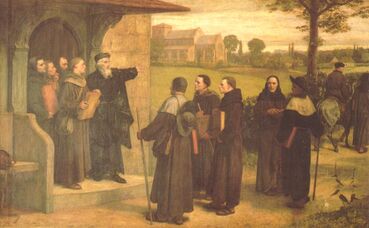 Scripture Alone is our Authority In 1378 Wycliffe completed the book “The Truth of Holy Scripture.” In it he wrote: “Holy Scripture is the pre-eminent authority for every Christian and the rule of faith and of all human perfection…it is necessary for all men, not for priests alone…Christ and His Apostles taught the people in the language best known to them…therefore the doctrine should not only be in Latin, but in the vernacular…the more these are known the better…believers should have the Scriptures in a language which they fully understand.” Wycliffe taught that Scripture contains everything that is necessary for our salvation. All other authorities must be tested by the Scripture. “Christ’s Law is best and enough and other laws men should not take, but as branches of God’s Law.” Translating the Scriptures Therefore Wycliffe supervised a handful of scholars at Oxford in the translation of the Latin Bible into the English language. This was the very first translation of the entire Bible into the English language. The only source that Wycliffe’s translators had to work with was a Latin hand-written manuscript of a translation made 1000 years previously. Wycliffe is called “the father of English prose” because of the clarity and effectiveness of his writings and sermons which did much to unify and shape the English language. The Lollards Evangelise England From Oxford, Wycliffe trained and sent out “poor priests” (the Lollards) into the fields, villages and churches, to preach in the marketplaces, to read and sing the Scriptures in English and to win people for Christ. These itinerant evangelists became a tremendous power in the land as they spread the knowledge of the Scriptures throughout England. 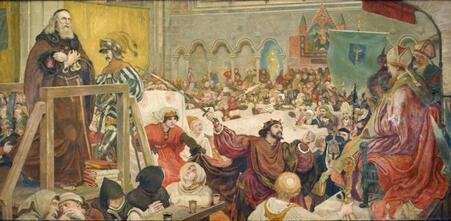 Persecution from Papal Pharisees As a result of these activities and teachings, one pope issued five bulls against John Wycliffe for “heresy.” The Catholic Church tried him three times and two popes summoned him to Rome. However, Wycliffe wisely refused each summons and the political protection of the Duke of Lancaster and Queen Anne kept Wycliffe alive and free. He was never imprisoned. However, his followers were hunted down, expelled from Oxford and mercilessly persecuted. Hatred for the Bible in the Common Language To get an idea of the scandal and controversy engendered by Wycliffe’s Reformation, we should note what was written by Henry Knighton, a Catholic chronicler: “Christ gave His Gospel to the clergy…but this master John Wycliffe translated the Gospel from Latin into the English…common to all and more open to the laity and even to women…and so the pearl of the Gospel is thrown before swine and trodden under foot…the jewel of the clergy has been turned into the jest of the laity…has become common.” The Archbishop of Canterbury, Arundel, said: “that pestilent and most wretched John Wycliffe, of damnable memory, a child of the old devil and himself a child or pupil of anti-Christ…crowned his wickedness by translating the Scriptures into the mother tongue!” The Bible in English – Banned A synod of clergy in 1408 decreed: “It is dangerous…to translate the text of Holy Scripture…we decree and ordain that no-one shall in future translate on his authority any text of Scripture into the English tongue or into any other tongue, by way of book, booklet or treatise. Nor shall any man read, in public or in private, this kind of book, booklet or treatise, now recently composed in the time of the said John Wycliffe…on the penalty of the greater excommunication.” Earthquake Interrupts Anathemas In 1382, at a church council called by Archbishop Courtenay, 24 of Wycliffe’s teachings were condemned. During that council there was an earthquake. Wycliffe and the Lollards interpreted the earthquake as a sign of God’s displeasure with the corrupt and un-Biblical Roman clergy. Rome Vs. Jerusalem Wycliffe scorned the idea that because Peter died in Rome therefore every Bishop of Rome is to be set above all of Christendom. By the same reasoning, he noted, the Muslim Turk might conclude that because they controlled Jerusalem, where Christ died, their Mullah has power over the pope! 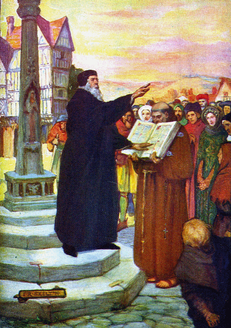 Who Can Forgive Sins? Wycliffe attacked the corruptions, superstitions and abuses of the friars and monks. He exposed their supposed powers to forgive sins as fraudulent. “Who can forgive sins?” Wycliffe taught: “God alone!” Christ alone is the Head of the Church and God alone can forgive sins. Field Workers of the Reformation Wycliffe’s field workers (the Lollards) helped to prepare the way for the English Reformation (in the 16th Century) by reading, preaching and singing the Scriptures in English in marketplaces, fields and homes throughout the land. Turning the Tables Summoned to appear before a church council Wycliffe rebuked the bishops for being “priests of Baal, selling blasphemy and idolatry in the mass and indulgences.” He then walked out of the assembly and refused a summons from the pope. When Wycliffe was excluded from teaching in Oxford, he withdrew to the congregation at Lutterworth, in Leicestershire, where he devoted himself to writing during his few remaining years. Wycliffe’s Ashes and Doctrine In 1428, 44 years after Wycliffe’s death, by order of the pope, the bones of Wycliffe were dug up and burned. As one historian commented: “They burned his bones to ashes and cast them into the Swift, a neighbouring brook running close by. Thus the brook conveyed his ashes to the Avon, the Avon into the Severn, the Severn into the narrow seas and they into the main ocean. And so the ashes of Wycliffe are symbolic of his doctrine, which is now spread throughout the world.” Wycliffe was the father of the Reformation – its morning star. Wycliffe’s writings and example inspired John Hus and Martin Luther. “The fear of the Lord is the beginning of wisdom and the knowledge of the Holy One is understanding.” Proverbs 9:10 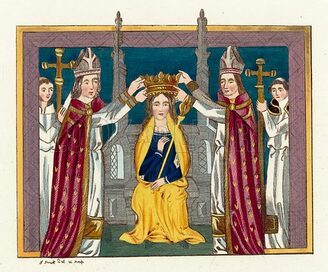 Anne of Bohemia (1366 - 1394) The Reformers Friend Anne of Bohemia was the eldest daughter of Emperor Charles IV of the Holy Roman Empire. Her brother was King Wenceslaus of Bohemia (who was named after the subject of a famous Christmas carol). A Great Love for the Scriptures Anne was taught the truths of the Scripture from her youth. There were a number of faithful Gospel preachers in Bohemia at that time including Conrad Strichna, Johan Melice and Matthias Janovius. Anne asked many probing questions concerning Scriptural truths. An Inquiring Mind Anne was described as a godly, intelligent young girl with an inquiring mind. She was renowned for her love of reading and for her possession of the Scriptures in three languages. Her favourite books of the Bible were the four Gospels, which she constantly studied. A Hunger for Reformation Anne came to recognise the many errors prevailing in the Roman church and she persisted in praying for a return to Biblical faithfulness, to the Doctrine of the Apostles and to the purity of the early Church. 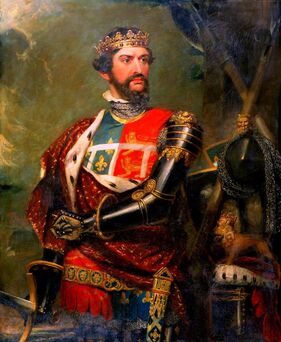 Crecy Changes Bohemia’s Allegiance The traditional alliance of Bohemia with France was shattered by their joint defeat at the hands of the English King Edward III and his son, The Black Prince, at the Battle of Crecy in 1346. Richard II’s Father, Edward, was called the Black Prince because of his dark coloured armour. Then the Papal Schism further divided the Bohemians from their traditional allies, the French. As France supported pope Clement VII of Avignon, King Wenceslaus chose to support pope Urban VI in Rome. As the English also allied against the French pope, the Bohemians came into alliance with the English. A New Alliance with England As King Richard II’s father, The Black Prince, died in 1376 and his grandfather, King Edward III, the following year, Richard II became King of England at age 10. Negotiations began to solidify the alliance between Bohemia and England by the marriage of Princess Anne to King Richard. A Courageous Young King At age 14, King Richard II showed remarkable courage during the Peasants Revolt of 1381. At Smithfield, at great personal risk, Richard II rode out to meet the violent mob and calmed them into ending the revolt. 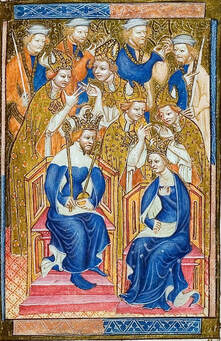 Marriage at Westminster In January 1383, when Richard II was 15 years old and Anne was 16 years old, they were married in St. Stephens Chapel, at Westminster. Although their marriage had been arranged by diplomats, it appears to have been a good, loving and positive partnership. Anne was undoubtedly an excellent influence on Richard during their 12 years together. A Friend of the Reformation Reportedly Anne had been persuaded to accept the proposal because of positive reports that she had received of the Reformation work of Professor John Wycliffe of Oxford University. The Archbishop of York, Arundel, one of the most vitriolic enemies of Wycliffe’s Reformation work, was horrified to hear that the Queen owned copies of the Gospels, which she avidly studied. Professor John Wycliffe was delighted to learn of Anne’s love for the Scriptures and he publically compared her to the Biblical Mary who sat at Jesus’ feet listening to what the Master had to say. Protecting the Professor For her part, Queen Anne protected Wycliffe from his many enemies and intervened on numerous occasions to protect him from prosecution and to save his life. 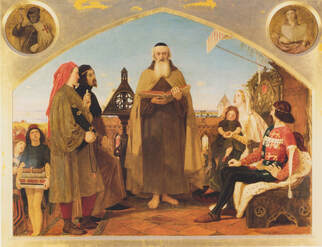 Students of Reformation At the encouragement of Queen Anne, Bohemian students came to Oxford to study under John Wycliffe. Many of these students carried back the Reformation writings and teachings of Wycliffe to Prague, Bohemia and throughout central Europe. Students sponsored by Queen Anne were soon taking the Reformation writings and teachings as far afield as Lithuania. Evangelistic Many of Queen Anne’s friends and servants became dedicated Christian believers. Generosity The common people of England came to love the Queen. Her kindness and generosity to the poor was legendary. It is said that as many as six thousand people were fed daily through her benevolence. Deeply Mourned Tragically, this bright and shining light was cut short on the 7 June 1394 as Anne died at age 27 from the plague. Her husband, King Richard II, was devastated and the people of England deeply mourned her. 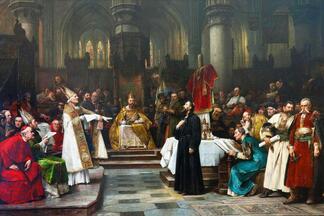 The Reformation comes to Bohemia Many of her Christian friends and servants returned to Bohemia with the translations of the Gospels and writings of John Wycliffe that had been so highly treasured by Queen Anne. These led to the conversion of Professor Jan Hus of Bohemia, the Hussite movement and later the Moravians. From them missionaries went out, literally, to the ends of the earth. “These things command and teach. Let no one despise your youth, but be an example to the believers in word, in conduct, in love, in spirit, in faith, in purity. Till I come, give attention to reading, to exhortation, to doctrine. Do not neglect the gift that is in you, which was given to you by prophecy with the laying on of the hands of the eldership. Meditate on these things; give yourself entirely to them, that your progress may be evident to all. Take heed to yourself and to the doctrine. Continue in them, for in doing this you will save both yourself and those who hear you.” 1 Timothy 4:11-16 Jan Hus (1372 - 1415) The Reformer of Prague The Reformation movement launched by Wycliffe and his Lollards in England was intensely opposed and fiercely persecuted by the Roman church. The Reformation movement was largely driven underground in the British Isles. But Wycliffe’s teachings spread to Bohemia where they resulted in a dynamic revival. The two nations of England and Bohemia were linked in 1383 by the marriage of Anne of Bohemia to King Richard II of England. Prague students went to Oxford and English students went to Prague. Preparation for Reformation Scripture translations from the persecuted Waldensian refugees had begun entering Bohemia in the 13th Century. When Anne of Bohemia married King Richard II she sent copies of Wycliffe’s writings back to her homeland. Queen Anne’s love for the Bible was shared by many of her countrymen. Soon, Conrad Stickna was preaching the Gospel in the open air to large crowds. Matthew of Janov travelled throughout Bohemia preaching against the abuses of the church. His followers were imprisoned and burned at the stake. John Milic, Archdeacon of the cathedral in Prague, preached fearlessly against the abuses of the church and wrote “Anti-Christ Has Come” over a cardinal’s doorway. He was imprisoned. 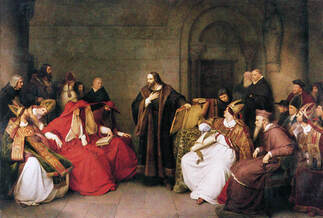 Courageous Czech Confronts Corruption Born in the village of Husinec, Jan Hus studied for the priesthood and received a Master’s degree in 1396. In 1402 he was appointed preacher in Bethlehem Chapel. Jan Hus, when appointed Rector of Prague University at age 34, also began to preach Reformation principles (in the common language) in the Chapel of Bethlehem in Prague. Hus translated Wycliffe’s works into German, exposed the superstitions, fraudulent “miracles” and the sale of indulgences. In 1405, Hus denounced the alleged appearances of “Christ’s blood” on communion wafers as an elaborate hoax. He condemned the sins of the clergy as “fornicators”, “parasites”, “money misers”, “fat swine”, “drunks” and “gluttons.” He condemned the practice of simony (buying spiritual offices) and the taking of multiple paid positions without faithfully serving any. He described churches that sold indulgences as “brothels.” Hus adopted Wycliffe’s view of the Church as an elect community with Christ – not the pope – as its true Head. Hus' fiery sermons in the Bohemian language received widespread enthusiastic support. Hus believed pastors should be examples of God-fearing integrity. He preached vivid, accessible sermons, which captured the people’s imaginations. Hus was described by his supporters as “a passionate Reformer.” On the walls of the Chapel of Bethlehem were paintings contrasting the behaviour of the popes and Christ. The pope rode a horse; Christ walked bare-foot. Jesus washed the disciples’ feet; the pope preferred having his feet kissed. Hus insisted that no human institution – including the church - can be ultimate in authority. Only God has ultimate authority. In 1410 the Archbishop obtained from the pope a ban on teaching in chapels, including specifically the Bethlehem Chapel. This ban Hus refused to obey. In that same year the Archbishop burned over 200 volumes of Wycliffe’s works. Hus responded: “Fire does not consume truth. It is always the mark of a little mind that it vents its anger on inanimate objects.” Hus defended Wycliffe’s orthodoxy. Hus was summoned to Rome, but wisely refused to go. 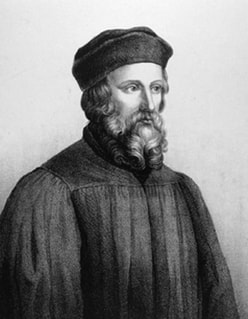 The papacy Strikes Back Archbishop Zbynek excommunicated Hus. (Hus was actually excommunicated 5 times) Hus was described as “radical” and “dangerous.” Hus then openly attacked the pope’s sale of indulgences in support of his war against Naples. The pope thereupon placed the City of Prague under a papal interdict. This meant that the entire city was placed under an ecclesiastical ban (all churches were closed, no masses were allowed, no confessions received, no marriages or burials permitted). Until this time Hus had been protected by the king, university and nobility from the wrath of the pope. But with the entire city in turmoil, the Reformer chose to go into exile. During this time Hus wrote: “On the Church.” And he preached in the villages and countryside. Treachery at Constance Hus lived during The Great Schism when Europe was divided between two and then three rival popes who bitterly anathematized one another. A General Church Council was called at Constance in 1415 to heal ‘The Great Schism’ (that had raged from 1378). It was this Council of Constance, which aimed to bring the Schism to an end, that summoned Hus. The Emperor Sigismund guaranteed Hus safe conduct in both directions, whatever the outcome of the case against him might be. However, upon arriving, Hus was imprisoned on orders of pope John XXII. Despite the Imperial guarantee of safe conduct, Hus was taken through a mockery of a trial in which he was allowed no defence. Hus had hoped to present his views to the assembled authorities, but instead he found himself a victim of a cruel Inquisition, which condemned him for heresies, which he had neither believed nor taught (including that he had claimed to be the fourth member of the Trinity!) Hus prayed aloud that Christ might forgive his judges and accusers. 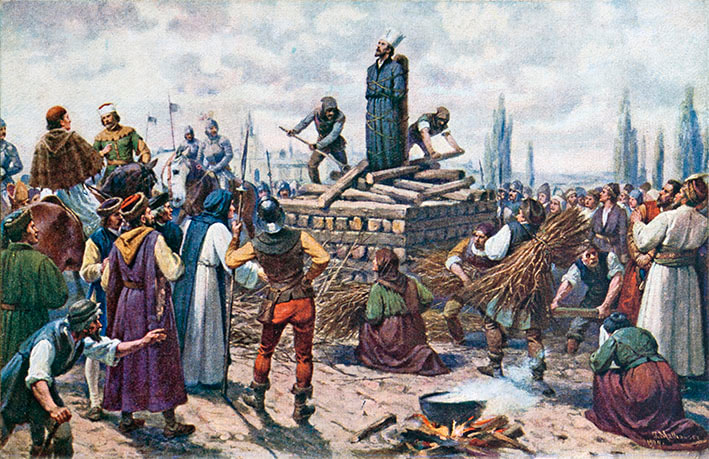 Steadfast to the End Under pressure to recant Hus declared: “I would not, for a chapel full of gold, recede from the truth…the truth stands and is mighty forever.” Hus stated that he would prefer to be burned in public than to be silenced in private “in order that all Christendom might know what I said in the end.” On 6 July 1415 Hus was condemned to death and taken to the outskirts of the city of Constance to be burned. Hus prayed: “O most holy Christ…strengthen my spirit…give me a fearless heart, a right faith, a firm hope, a perfect love, that for Thy sake I may lay down my life with patience and joy.” On arriving at the execution ground, Hus knelt and prayed: “God is my witness that the evidence against me is false. I have never thought nor preached except with the one intention of winning men, if possible, from their sins. In the truth of the Gospel I have written, taught and preached; today I will gladly die.” Hus died singing “Jesus, Son of the Living God, have mercy on me.” He was 43 years old. Resistance to Rome Spreads After Hus' martyrdom his followers organised military resistance to the Holy Roman Empire. Remarkably, these vastly outnumbered Hussites repelled six crusades against them. These Hussites fought under Hus' motto: “Truth conquers.” They proved that you could take on the Holy Roman Empire – and survive! A Spiritual Heritage His followers, The Unity of the Brotherhood, survived as an independent church, co-operating with the Waldensians and later with the Lutherans and the Calvinists. The Hussites became known as the Moravians. Under Count Nicholas Van Zinzendorf the Moravians started a prayer chain that lasted 150 years! During that extended prayer meeting, 2,400 Moravian missionaries were sent throughout the world. Moravians were instrumental in the conversion of John Wesley. The Goose and the Swan One interesting anecdote is that Hus is accredited with making a prophecy at his death. “My goose is cooked!” he said. (Hus is the Bohemian word for goose!) “But a hundred years from now a swan will arise whose voice you will not be able to silence.” Many saw Martin Luther as that voice, hence the prevalence of swans in Lutheran art and architecture. 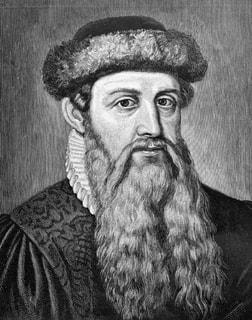 Johannes Gutenberg (1400 - 1468) The Inventor of the Printing Press Man of the Millennium At the end of the 20th Century, numerous publications discussed who they believed were the most important people of the millennium. Johannes Gutenberg, the inventor of the Printing Press, was in everybody’s top 10 and many voted him as The Most Important Man of the Millennium! An Insatiable Appetite for Knowledge Johannes Gutenberg was born in the city of Mainz near the shores of the Rhine River. His father, Friel Gensfleisch, married Else Von Gutenberg, who gave her name to her second son, Johannes. As a young boy, Johannes developed an insatiable appetite for knowledge, reading every book he came across. An Itinerant Student During his teen years, Johannes and his family were forced into exile twice due to political in-fighting and conflicts. Johannes travelled from town to town, studying monuments and visiting men who were renowned for their knowledge in science, art, or the trades. He travelled alone, on foot, carrying a knapsack with his precious books and clothes. As an itinerant student, he travelled throughout Italy, Switzerland, Germany and Holland. A Deepening Love and Growing Vision His love for God grew and deepened the more he read and studied. The further he travelled, the greater his vision developed of spreading the Word of God to all people. 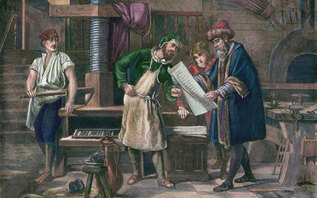 Inspiration One day, in Haarlem, his friend, Lawrence Koster, handed him a piece of wood that had letters carved on it, wrapped in a piece of parchment. Some of the sap from the greenwood had hardened into the relief shape of the letters on the parchment. As Johannes saw this simple plaque of wood an inspiration flashed into his heart and mind with the force of lightning. The possibility of producing a machine that could print the Word of God welled up inside him. Gutenberg travelled up the Rhine to Straßburg and closeted himself in his workroom. Tools and Testing He fashioned his own tools, developed plans, tested and tried, reorganized and attempted again and again to produce an effective printing machine. Starting with moveable wooden types, he bored through the side of each a small hole to string together the letters of the alphabet cut in relief on one side. An Immense Vision Johannes Gutenberg seemed to understand something of the immense importance of this invention upon industry, society and civilisation itself. When he contracted a skilful craftsman, Conrad Saspach, to create a full size version of his scale model, the craftsman responded: “But it is just a simple press you are asking from me Master Hans.” “Yes,” replied Gutenberg, “It is a press, certainly, but a press from which shall soon flow in inexhaustible streams the most abundant and most marvellous liquor that has ever flowed to relieve the thirst of man! Through it God will spread His Word. A spring of pure truth shall flow from it! Like a new star, it shall scatter the darkness of ignorance and cause a light heretofore unknown to shine among men.” 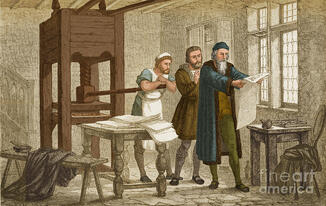 Limitations and Secrecy Despite his great vision, Johannes was acutely aware of his limitations. He was just one man, with very limited resources. He was concerned about his work being discovered and possibly pirated for lesser goals. He worked on the mechanics of printing secretly, moving his workshop into the ruins of an old deserted monastery. Dedication and Discipline He spent sleepless nights wearing himself out in pursuit of his invention. He engraved his movable types in wood and projected casting them in metal. He studied hard to find the means of enclosing them in forms, whether of wood or of iron, to make the types into words, phrases, lines and to leave spaces on the paper. He invented coloured mediums, oily and yet able to dry, to reproduce the characters, brushes and dabbers that spread the ink on the letters, boards to hold them and screws and weights to compress them. He invested months and years and his entire fortune in these experiments. There were many disappointments, failures and frustrations before he developed a model press, which combined all elements for an efficient printing press. The First Book Ever Printed The first book to be printed had to be the Holy Bible; the second was the Psalter (the first book to ever bear a date: 1457). The Gutenberg Bible, completed in 1455, was the first book ever published with movable type. Fewer than 200 copies were originally printed and only 48 have survived to this day. Today, the original Gutenberg Bible is considered one of the finest works of art. In 1978 a two-volume edition of the Gutenberg Bible was sold for over $2 million. In 1987 a Gutenberg Bible was sold for $4,9 million, the highest price paid for a book to that date. 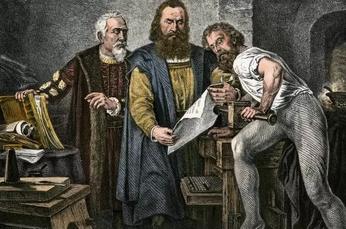 Overcoming Opposition At first the Roman Catholic church opposed the Printing Press. For political reasons and for the survival of his invention, Gutenberg wrote a dedication to pope Paul II on behalf of the Printing Press: “Among the number of blessings which we ought to praise God is this invention, which enables the poorest to procure libraries at a low price. Is it not a great glory that volumes that used to cost 100 pieces of gold, are now to be bought for four, or even less and that the fruits of genius… multiply over all the earth!” Hijacked Soon Gutenberg could not sustain the demand for printing in his small workshop. He was forced to develop partnerships with moneylender Johann Fust, who unfortunately did not have the integrity of the inventor. Fust hijacked his invention and stole everything from Gutenberg. Despite these trials and betrayals, Gutenberg maintained his integrity and honour, maintaining a faithful Christian witness to the end. One of the Greatest Inventions in History Gutenberg’s invention of the Printing Press is rightly classified as one of the greatest events in the history of the world. The Printing Press prepared the way for the Reformation and the progress of modern science and literature. The Printing Press became an indispensable tool in the fulfilment of the Great Commission and the development of universal education. Gutenberg’s invention enabled multiplied millions to discover for themselves great literature and, most importantly, the Word of God. 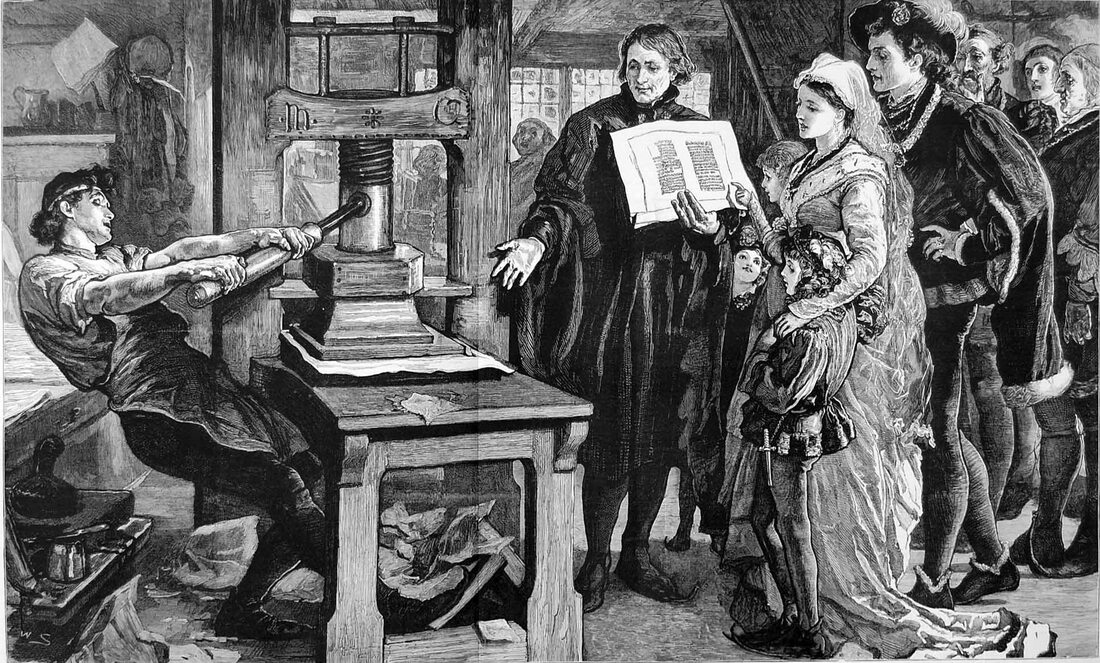 The Reformer’s Friend, the Tyrant’s Foe This one invention made possible the greatest Revival of Faith and freedom ever experienced. The inventing of the Printing Press played a key role in mobilising the Reformation. Without printing, it is questionable whether there would have been a Protestant Reformation. A century before Luther, Wycliffe and Hus had inspired dedicated movements for Bible study and Reform, but the absence of adequate printing technology severely limited the distribution of their writings. As a result their ideas did not spread as rapidly, or as far, as they could have done. By God’s grace, the Printing Press provided the Reformers, Martin Luther, Ulrich Zwingli, William Tyndale, John Calvin and others, with the spiritual weapons they needed to make the Reformation succeed. “Making disciples of all the nations, teaching obedience to all things…” Matthew 28:19 Girolamo Savonarola (1452 – 1498) Italian Reformer and Martyr Serious and Intelligent Born of Italian nobility in the city of Ferrara in 1452, Savonarola was described as a serious and intelligent boy who, at an early age, gravitated to the writings of some of the most learned men in history. He received instruction in philosophy, logic and medicine from his father and grandfather. From studying the writings of Plato and Dante, he came to develop a deep spiritual hunger. The pictorial illustrations of hell in Dante’s Inferno tormented him. The Centre of the Renaissance In 1475, he decided to become a monk and joined the Dominicans. After an intense time of study, he was sent to the city of Florence. In the 15th Century, the centre of the Renaissance was Florence, Italy. From this centre of science and art, masters such as Michelangelo, Leonardo Da Vinci and Raphael produced exquisite and timeless art. 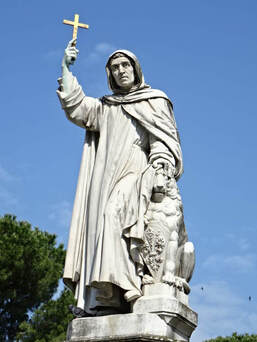 Fearless Preaching In studying the writings of Augustine of Hippo, Savonarola came to see how far the church had fallen from its Apostolic calling. Girolamo Savonarola began fearlessly to preach Christ amidst the moral decay, irreligious lifestyles, superstitious beliefs and unbiblical practices of the clergy and community. He was 38 years old when he began his work of Reformation in Florence. Confronting Corruption Vast crowds gathered to hear his denunciations of the prevalent corruption and immorality. The majestic cathedral was filled to over-flowing by citizens of Florence eager to hear this celebrated orator expose the corruptions of the ruling Medici family and the idolatry and corruptions of the Roman church. Savonarola preached repentance from sin with a growing earnestness. Many hardened sinners surrendered their lives to Christ and forsook their evil ways of life. Incorruptible The ruler of Florence, Lorenzo de' Medici, tried to silence the Reformer with gifts and attempted bribes. However, Savonarola was relentless and incorruptible. When Lorenzo was dying, at age 44, he sent for Savonarola, but when the Reformer found that Lorenzo had no intention of repenting of his sins, he refused him the blessing which was customary to grant to the dying. 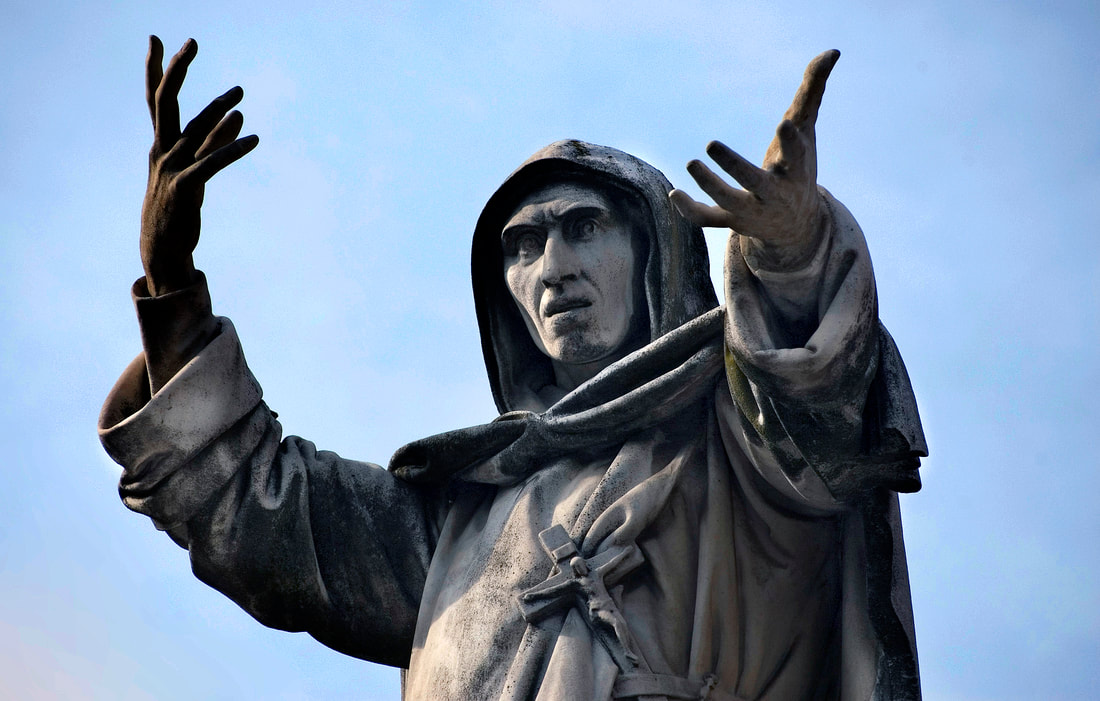 Reformation in Florence The people ousted Lorenzo’s son and unanimously chose Savonarola as ruler of Florence. For three years Savonarola governed Florence with justice and efficiency. Savonarola intended the city to become an example of a Christian commonwealth in which God is the Ruler and His Gospel the Sovereign Law. Dens of iniquity and vice were closed down. Gambling was outlawed; licentious books and pictures were destroyed in a “bonfire of vanities.” Papal Power Play Some people began to resent the strictness of the new rule. Pope Alexander was one of the most notoriously immoral popes with five illegitimate children whom he openly promoted to high office. This pope engaged in the most unscrupulous conduct, including bribery and murder. Pope Alexander VI took the lead in attacking the Reformer of Florence. Firstly, Alexander VI tried to make Savonarola a cardinal and offered him great bribes. Savonarola rejected all these declaring: “I do not desire any other crown than the crown of a martyr.” Excommunication and Torture Thereafter the pope attempted to spread slander to undermine the authority of Savonarola. Then the pope excommunicated and imprisoned him. People who had previously acclaimed and supported Savonarola now allowed him to be tortured and joined in a chorus of condemnation of the courageous Reformer. 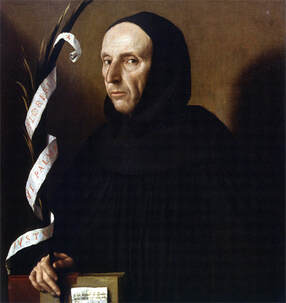 Steadfast However, Savonarola remained steadfast. He refused to be shaken in his convictions even after the most unbearable tortures. On 23 May 1498, Savonarola was burned to death in the great square in the city of Florence. Before a huge crowd, a bishop declared to the condemned Savonarola: “I separate thee from the church militant and triumphant.” Savonarola responded: “Militant, not triumphant, for you have no power to separate me from the Church triumphant - to which I go.” Savonarola died at age 45. Regeneration “We must regenerate the church,” taught Savonarola. “None are saved by their own works. No man can boast of himself; and if, in the presence of God, we could ask all these justified of sins – have you been saved by your own strength? All would reply as with one voice: ‘Not unto us O Lord! Not unto us; but to Him be the glory!’” Scripture Alone Savonarola gave special emphasis to the authority of the Bible. “I preach the regeneration of the church, taking the Scriptures as my sole guide.” Christ Alone As Savonarola was being severely tortured on the rack, he prayed: “O Lord… I do not rely on my own justification, but on Thy mercy.” In between his tortures, he wrote meditations on Psalm 32 and 51, which Martin Luther later published, describing them as: “a piece of Evangelical testimony and Christian truth.” Courage and Faith Savonarola met his martyrdom with courage and faith, declaring: “Should I not willingly die for His sake Who willingly died for me, a sinful man?” “Do not be afraid of those who kill the body and after that have no more that they can do.” Luke 12:14 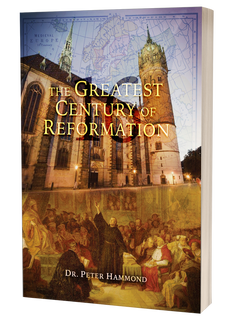 Dr. Peter Hammond Email: [email protected] Website: www.FrontlineMissionSA.org This article is adapted from a chapter of The Greatest Century of Reformation, by Dr. Peter Hammond. It is available from Christian Liberty Books, PO Box 358, Howard Place 7450, Cape Town, South Africa, tel: 021-689-7478, email: [email protected] and website: www.christianlibertybooks.co.za. Endorsement: “The Greatest Century of Reformation presents the history of the Reformation in a compact, readable and winsome way, encouraging us to stand firm in our beliefs regardless of the consequences. It parallels in some ways the leading of the Holy Spirit in the early Church as Paul, the Apostles and the early believers preached and taught the Gospel. I am delighted to have received the book and for the dedication you gave. May God richly bless and use it in His Kingdom.” Dr. R.C. Sproul, Ligonier Ministries.
0 Comments
Leave a Reply. |
Contemporary ArticlesCategories
All
Archives |
- Home
-
History Articles
- History Articles
- All Categories
- Character Studies
- Greatest Century of Missions
- Greatest Century of Reformation
- Reformation In Bohemia
- Reformation In England
- Reformation In France
- Reformation In Geneva
- Reformation In Germany
- Reformation In Italy
- Reformation In Scotland
- Reformation in Switzerland
- Victorious Christians
- Contemporary Articles
- Resources
- Contact
- Donate
|
The Reformation Society
PO Box 74, Newlands, 7725, South Africa Tel : (021) 689-4480 Email: [email protected] Copyright © 2022 ReformationSA.org. All rights reserved |
- Home
-
History Articles
- History Articles
- All Categories
- Character Studies
- Greatest Century of Missions
- Greatest Century of Reformation
- Reformation In Bohemia
- Reformation In England
- Reformation In France
- Reformation In Geneva
- Reformation In Germany
- Reformation In Italy
- Reformation In Scotland
- Reformation in Switzerland
- Victorious Christians
- Contemporary Articles
- Resources
- Contact
- Donate
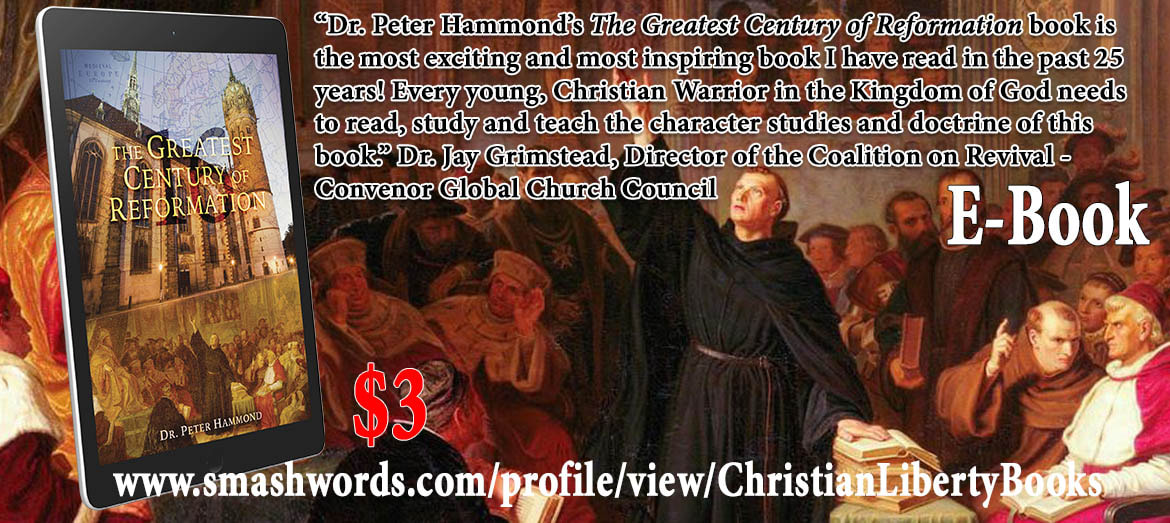
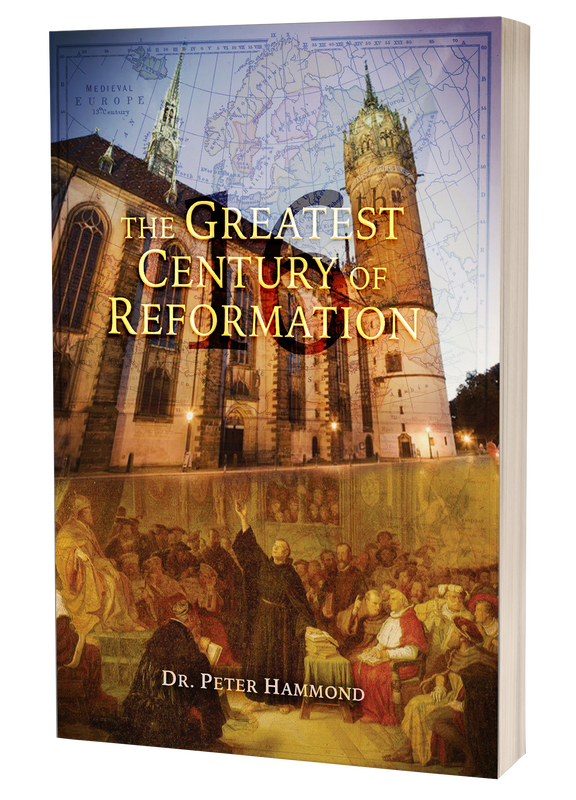
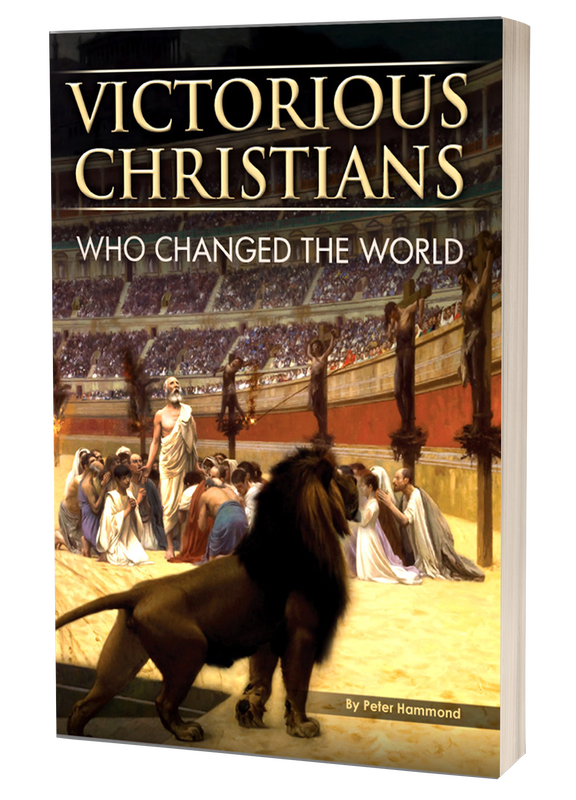
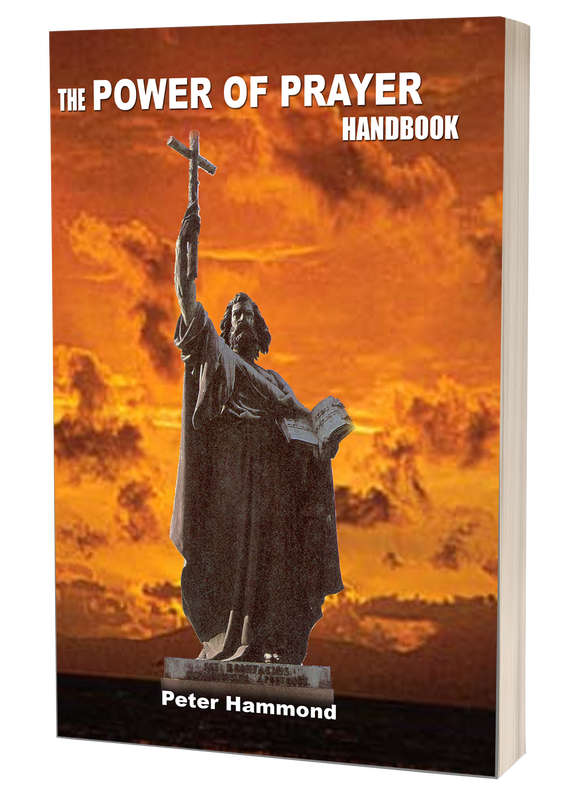
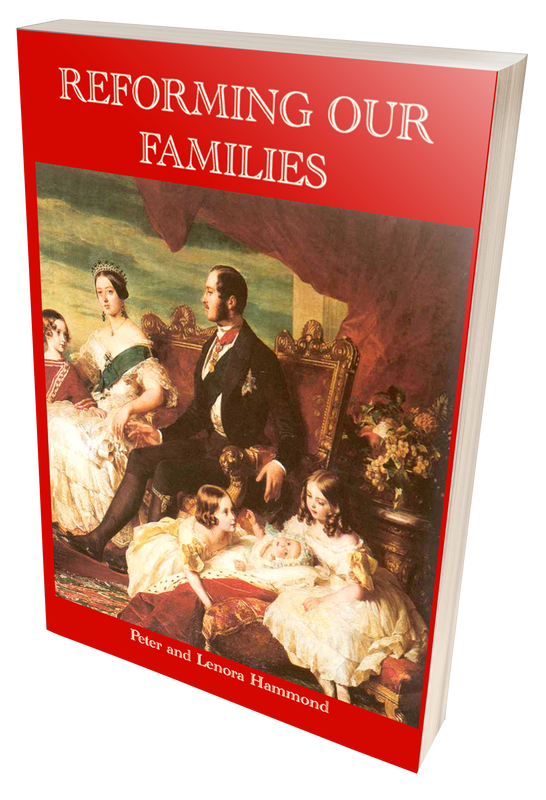
 RSS Feed
RSS Feed
